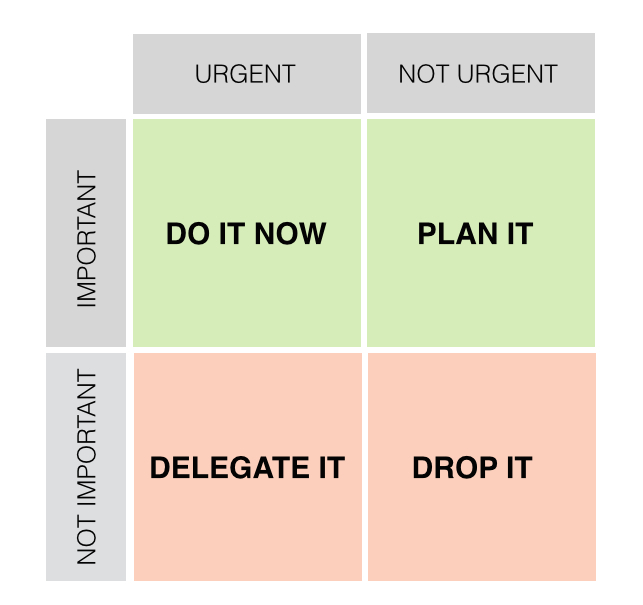My last post on feeling “stuff-ocated“ discussed how to determine the right boxes to tick off so you don’t try to do it all at once.
Identifying what’s important (aka your right boxes) helps weed out the mundane, time-wasting, energy-sucking tasks. It provides you the necessary clarity to shift your priorities so you can move in a better, more meaningful direction.

Urgent vs. important
Dwight Eisenhower (yep, I’m talking about the 34th American President here) famously said, “What is important is seldom urgent and what is urgent is seldom important.”
Those in the realm of productivity ran with this quote and developed the Eisenhower Box: a tool to help people better manage their time.
What is urgent must be immediately addressed though it might not be the most important thing on the agenda. What is important must (generally) be done consistently or with a deeper personal investment.
As you can see from the image above, there are four D’s: do, decide, delegate and delete. Use these keywords when determining what to do with each task you have.
When something comes up, you have four options:
01. Do the thing
02. Schedule a time when you’ll do the thing
03. Find someone else to do the thing
04. Throw the thing away
You’ll notice that letting that thing idle on your to-do list is not an option. The key is to act on everything in some way—even if that way means getting rid of it.
How to prioritize what’s important to you
Now that you know your urgent from important, it’s up to you to prioritize the important. How? Unfortunately Eisenhower didn’t specify that part. I will.
[bctt tweet=”The key to doing what’s important to you lies in first defining what’s important to you.” via=”no”]
There will always be tasks, responsibilities, and new opportunities on or approaching your plate. How do you decide which to do? How to determine what’s worth your time and energy?
I measure importance using a checklist inspired by this Ted Talk. In this talk, artist Shea Hembrey uses three h’s—head, heart, and hands—to determine what makes great art. These words have stuck with me as my criteria for determining whether or not I should invest myself in something.
Head
Does this interest or intrigue me?
Will this teach me something or lead to self-improvement and growth?
Heart
Will this allow me to explore my curiosities and passions?
Is it something I’m enthusiastic about and truly want to dive into?
Hands
Is this something that I can realistically work on?
Do I have the flexibility to shape this into something that will benefit me?
Ask yourself important questions—whatever your version—to guide your decisions. Whatever your questions, evaluate what’s on your plate regularly.
Act on this:
01. Deal with what’s urgent. What needs your attention? Do, decide, delegate, or delete each item.
02. Next, move onto what’s important. Organize your tasks and to do list using Eisenhower’s Box.
03. Finally, make a list of questions you will ask when new tasks and opportunities arise. These questions will become your checklist to determine whether or not a new opportunity is worth your personal investment.
Leave a comment!
It’s up to you to ensure you’re getting the nourishment you need. How do you measure the importance of your tasks?
Get the newsletter
Twice a month, I send tips and tools for time, task, and energy management, work-life wellness, and more.



